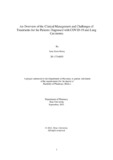An overview of the clinical management and challenges of treatments for the patients diagnosed with COVID-19 and lung carcinoma

View/
Date
2021-09Publisher
Brac UniversityAuthor
Bristy, Israt ZerinMetadata
Show full item recordAbstract
During the COVID-19 disease outbreak, the main objective of lung carcinoma treatment is to reduce the risk of contamination to patients and workers while simultaneously controlling all life-threatening elements of the illness. The pathophysiology of the development of lung cancer includes multiple genetic mutations, chromosomal abnormalities, and the presence of viruses. Nucleic acid SARS-CoV-2 detection & nasopharyngeal swab is used in the diagnosis of COVID-19 as well as an image-guided biopsy low-dose computed tomography is utilized for lung cancer identification. Furthermore, the challenging task of the management of chemotherapy, immunotherapy, therapeutic objectives, or optimal support services should be adjusted to the tumour types of the patient, the biomarkers, taking into consideration the risk of adverse effects and the potential of COVID-19 contamination. So, the overall treatment strategy of these patients is very prudent to avoid any further delay that could compromise survival with the challenges they are facing now.
